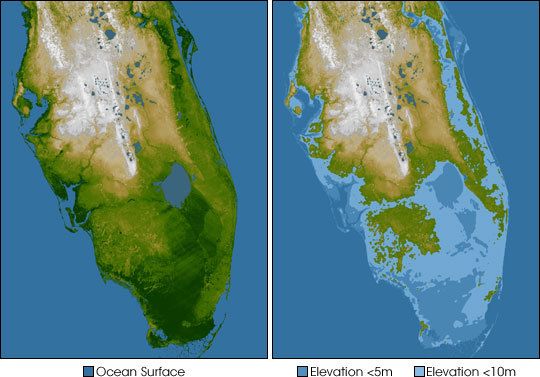

Yesterday, the Florida Center for Investigative Reporting revealed that officials in the Florida Department of Environmental Protection (DEP) were banned from using the phrases “climate change” and “global warming.”
The DEP is responsible for studying and planning for sea level rise, expected to affect Florida more than any other state in the country, but the terminology employees were allowed to use in all types of communication was limited because of the governor’s oft-repeated belief that climate change is not caused by human activity. “It’s an indication that the political leadership in the state of Florida is not willing to address these issues and face the music when it comes to the challenges that climate change presents,” Christopher Byrd, a former DEP attorney, told the FCIR.
Though the leadership may not have intended it, restricting the use of terms like “global warming” and “climate change” may actually help those trying to make preparations for rising sea levels. Polls have shown that people respond differently even to the terms “global warming” and “climate change” depending on their political affiliations.
In 2014, a Gallup poll asked people how worried they were about climate change versus how worried they were about global warming. Overall, 60 percent of people said they were either worried “a great deal” or “a fair amount” about climate change, while 56 percent said they were worried the same amount about global warming. The difference may be small, but it shows that the public doesn’t interpret the terms identically.
Seen through the lens of political affiliations, the gap becomes much more pronounced. Twenty-four percent of Democrats said they see global warming as a crisis, versus 8 percent of Republicans. Fewer people—18 percent of Democrats and 5 percent of Republicans—saw climate change as a crisis.

Though Florida is a blue state, it’s fairly politically divided; 40 percent of Floridians are Democrats, and 36 percent are Republicans.

Current governor Rick Scott is a Republican. In February, he revealed a $106 million plan to stave off the destruction of its cities and beaches from rising seas. Critics say the plan isn’t nearly as comprehensive as it needs to be to save the property and infrastructure at risk–a practical concern that seems to cross party lines. While that doesn’t ensure the plan will become more extensive, Scott is confronting the effects of rising sea levels, whether he wants to call it climate change or not, and Floridians are likely to follow suit.
In the end, sweeping issues of climate change under the rug could be disastrous, especially for a state as vulnerable as Florida. However, removing polarizing terminology may make the debate less political and more pragmatic, calling Floridians of all political affiliations to action.
